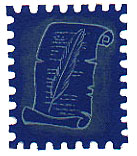

| |
| Poetry |
"Shall I Compare Thee to a Backfill Pile?" April 27, 2000 |
| by Mike Chasar | |

I grew up in Ohio's Cuyahoga River Valley where the names of woods and streams recall the native people who walked there long ago. In such a setting the connection between words and the past--and between the past and poetry--seems only natural.
"Ashkelon's Dead Babies" was inspired by a March/April 1997 story in ARCHAEOLOGY about an Israeli site where the bodies of nearly 100 infants were found in a late Roman/early Byzantine sewer beneath a bathhouse. "The Hanging Coffins of the Bo People" has its roots in the magazine's September/October 1991 article about a medieval Chinese culture that flourished for 400 years before vanishing from history.
Ashkelon's Dead Babies
|
I hardly remember my mother. A smell, a fragment of touch, a dark henna swirl on her hand. A circle of light off to the right of her head. The others remember as much, or less, sometimes the pungence of strangers, the snort of a donkey, but always a candle, a lantern, a halo, something to guide the disposal. We circle on Thursdays, fatty elbow to fatty elbow, rolls of the belly and thigh we never outgrew. No one is teething, we suck on our gums and try to conjure our mothers: a split-lip, a ringlet of hair, a velveteen robe studded with quartz. And we try to fathom their motives. We remember the shock of the water, the light growing small as we came with a nautilus settle to rest in this world. We sit in a circle and stare through the darkness and sometimes we notice a movement, a ripple somewhere above us, wherein we kneel and wait for the waters to part. |
The Hanging Coffins of the Bo People
|
When deceased [they] had their bodies put in a box and taken to the mountains to be put in caves, or hung where others cannot reach. --Marco Polo They plunge to the ground, ringing like brass, and I wake and listen for bracelets rolling to town through the streets. I was nine, blanching the noodles for lunch the first time I heard, eleven the next, the horrible, cold, popping of bones--. The next time I ran to the face of the rock, the ringing caught like a shout in the crags. And I knelt at the five-sided casket of teak. And I looked at the body inside. And counted the 29 layers of shirts, the bracelets, the baggage, the wraps. And I started to sweat. I put my finger straight through the gap in its teeth. I was nine, blanching the noodles for lunch. I stole a bone from the body, pierced it and hung it around my neck on a string where it bobbed as I scoured the floors with lye. Red-handed, I went to the market for greens. When they plunge, I listen for bracelets knocking on rocks into town, the ring of the brass, then hesitant, toppling rolls through the wheel-ruts. And I rise, and go outside. And I walk to the cliffs where the moon is hanging by hardly a thread. |
Peking Man
|
Nine to five, scratching inside my skin, I stand behind the showroom's plexiglass and fake a furry squint as parents pass and tow their children by. Staring in (at my disheveled hide and sutured grin, my meal of nuts, berries, and prairie grass) gives them all a sense of pride. The past is past, evolved away. Certain that Darwin engaged in "honest, scientific pursuit," museum crowds (that suburban clan) assume they're evolution's juicy fruit, and God some chromosomal artisan. At five, I punch the clock, unzip my suit, And step outside, a twin to modern man. |
For more on Peking Man, see:
"Case of the Curious Cranium", October 20, 1999;
"Rethinking Human Evolution," July/August 1999; and
"Images of Dynasty," March/April 1999.
© 2000 by the Archaeological Institute of America archive.archaeology.org/online/features/poetry/chasar.html |
Advertisement

Advertisement






